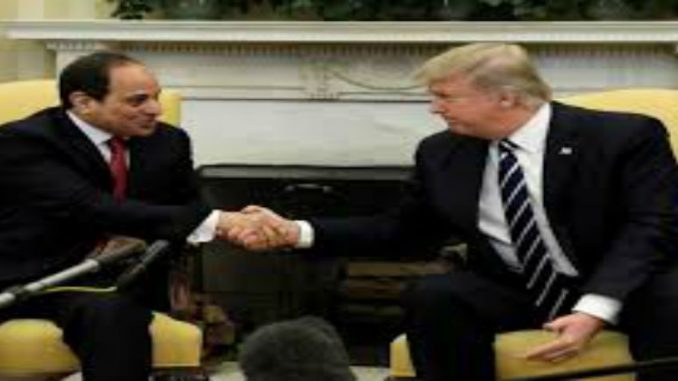
Although Egypt’s military dictator was received warmly in Washington, however, this wasn’t the case among all Congress members in Pennsylvania Avenue.
In this context, senator Patrick Leahy, D-Vt., the top Democrat on the Senate panel that controls foreign aid spending, said on his statement on al-Sisi’s visit to Washington that President Trump has spoken glowingly of al-Sisi, as he has of Russian President Putin and Philippine President Duterte.
“Strong leaders, he calls them, as if that is enough to justify our wholehearted support. Unfortunately, world history is replete with examples of strong, messianic leaders who abused their power in ways that caused immense hardship for their people, and divisiveness and conflict in their countries,” said Senator leahy.
Despite that, the White House has voiced its strong support for al-Sisi, and for U.S. – Egyptian relations. Moreover, President Trump has called al-Sisi a “fantastic guy”. “Ironically, that says a lot more about President Trump than it does about President el-Sisi,said Leahy.
According to the Democrat Senator, al-Sisi, a former general who seized power by force, has ruled with an “iron fist.”
The military ruler has effectively “banned pubic criticism of his government since the removal of former President Morsi, enforcing what amounts to a prohibition on protests and arresting hundreds of people in connection with the ban, many preemptively.”
Al-Sisi’s government has engaged in one of the widest arrest campaigns in the country’s modern history, targeting a broad spectrum of political opponents. Local civil society organizations estimate that between 40,000 and 60,000 people are detained on political grounds, such as for protesting or calling for a change in government.
“Police have accused many of having links to the Muslim Brotherhood, usually without evidence that they have advocated or engaged in violence,” said Leahy.
He added,” Many other detainees belong to other political organizations, or have no party affiliation.”
Senator Patrick Leahy described what’s going on in Egypt as “systematic crackdown on Egypt’s independent civil society” has left it on the “verge of collapse.”
According to human rights groups, nearly every prominent Egyptian human rights defender or civil society leader is banned from traveling as part of a judicial investigation into the foreign funding of their organizations.
In 2014, al-Sisi issued a law that would allow prosecutors to seek 25-year sentences for illegally receiving foreign funding.
Moreover, parliament has also proposed a new law regulating civil society organizations, which, if adopted, would effectively outlaw independent human rights work in the country.
Despite repeated requests by U.S. officials, including some Republicans and Democrats in Congress, al-Sisi’s government has refused to release those detained for political reasons for months or years without charge, or on trumped up charges like Egyptian-American citizen Aya Hegazy, according to the U.S. Senator.
Furthermore, Leahy pointed that the media has also been targeted,” with authorities threatening and jailing journalists who reported on political opposition.”
In fact, some foreign journalists have been barred from Egypt after writing articles critical of the government.
In this context, the Committee to Protect Journalists said in December 2016 that Egypt was the third-highest jailer of journalists.”
“This pattern of harassment and arrests is not new. It has been happening for years and, contrary to the representations of Egyptian officials, it is getting worse,”said leahy.
According to Human Rights Watch, members of the security forces, particularly the Interior Ministry’s National Security Agency, routinely torture detainees to elicit confessions.
This torture usually occurs during periods of enforced disappearance that can last for weeks or months. The widespread use of torture has also been reported by the State Department.
Despite hundreds of reported cases of torture and enforced disappearance, since 2013 only a handful of police officers have reportedly been punished for violating the law.
Leahy said that,”According to information I have received, prison conditions remain deplorable, and political detainees are beaten, often deprived of contact with relatives and lawyers, and denied access to medical care.”
He also added that the government’s use of U.S. aircraft and other military equipment in its counter-terrorism campaign against a local ISIS affiliate in the northern Sinai “has not only resulted in indiscriminate attacks against civilians and other gross violations of human rights, “it has made the terrorism situation worse.”
“Requests by myself, as well as State and Defense Department officials, and by independent journalists and representatives of human rights groups, for access to conflicted areas, have been denied,”he said.
So while President Trump and other U.S. officials unabashedly praise President el-Sisi, Leahy said,”I wonder how they reconcile their portrayal of him with his crackdown against civil society and brutal repression of dissent. In fact, it can’t be reconciled, and it damages our own credibility as a strong defender of human rights and democratic principles.”
He also said, “I want to reiterate what I said in this chamber on September 27, 2016, when I spoke about Aya Hegazy, the young Egyptian-American social worker currently detained in Egypt.”
Ms. Hegazy, along with her Egyptian husband and five employees of their organization “Belady”, has been accused of salacious crimes that the Egyptian authorities has yet to corroborate with any credible evidence, yet she has been jailed since May 21, 2014.
Just last month, a decision in her case was inexplicably delayed until later this month. It is long past time for her ordeal to end, according to his words.
In the end, Leahy said that after three decades of corrupt autocratic rule by former President Mubarak, “Egypt once again has a former military officer as President who has chosen to rule by force.”
According to Leahy, “It is neither justified nor is it necessary. Leahy said that If, on the contrary, al-Sisi were to demonstrate that he has a credible plan for transforming Egypt’s economy, for improving education and creating jobs, for respecting due process and other fundamental rights, and for addressing the discrimination and lack of economic opportunities that are at the root of the violence in the Sinai, the Egyptian people would support him.” He added that they would also have a brighter future.
“Instead, I fear that by relying on repression he is sowing the seeds of misery and civil unrest, which is in the interest of neither the Egyptian people nor the American people,”said the American Senator.
Last year, Senator Patrick Leahy submitted what is became known as “Leahy’s law” that required the State Department to suspend military aid to any individual, unit, or country that it determines “has committed a gross violation of human rights.”
In the same context, Human Rights Watch stated that al-Sisi’s official visit to Washington comes at a time when human rights are at a nadir in Egypt and under threat in the US.
Al-Sisi’s meeting with Trump is the first visit by an Egyptian head of state to the White House since 2009.
Al-Sisi, a former defense minister who overthrew Egypt’s first freely democratic elected president, Mohamed Morsi, in July 2013.
During his reign, the country oversaw the brutal dispersal of opposition protests that left more than 1,150 people dead.
Moreover, al-Sisi’s security forces have arrested tens of thousands of Egyptians and committed flagrant rights abuses, including torture, enforced disappearances, and likely extrajudicial executions, according to Human Rights Watch.
Sara Margon, Washington director at Human Rights Watch, said “Inviting al-Sisi for an official visit to Washington as tens of thousands of Egyptians rot in jail and when torture is again the order of the day is a strange way to build a stable strategic relationship.”
According to Human Rights Watch, “Al-Sisi, who was elected in May 2014, has presided over near-total impunity for abuses by the military and security forces and the severe restrictions on civil and political rights, effectively erasing the gains of the 2011 uprising that ousted the longtime ruler Hosni Mubarak.”
Furthermore,Human Rights Watch urged the US Congress to maintain,” at a minimum, the restrictions on security assistance from previous years unless there is serious and measurable progress on human rights, such as dropping the investigation into nongovernmental organizations, repealing the law banning protests, and beginning a review of the cases of those detained arbitrarily and sentenced solely for peacefully exercising their civil or political rights.”
It added that the Congress should ensure that the Trump administration cannot waive these restrictions.
Washington director at Human Rights Watch said, “Giving more money to the Sisi government is to the detriment of US and Egyptian interests.”
She added, “Neither side in this relationship seems interested in promoting human rights, but the gross abuses being committed by Egyptian authorities should compel Congress to keep limiting support.”



